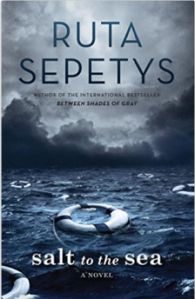Malcolm R. Campbell's Blog, page 194
March 12, 2016
Facebook Suffering Typewriter Infestation
It begins subtly.
There’s a small ad in the right-hand column from a nostalgia stock photo agency showing a guy with a pipe writing the great American novel on an ancient Underwood typeriter.
 A few days later, a woman is shown in a sponsored post typing her memoir, or perhaps journaling, via a somewhat more modern (but non-electric) portable.
A few days later, a woman is shown in a sponsored post typing her memoir, or perhaps journaling, via a somewhat more modern (but non-electric) portable.
Few people notice.
The following week, typewriters begin to appear in book promotion posts, inspirational status updates about the myth of writer’s block, and in pleas from publishers asking us to send them our best work (albeit in a DOCX file).
So far, the Centers for Disease Control appears not to have noticed the infestation.
Speculation from conspiracy fans is rife: (a) Those who distrust writers want to hypnotize us into using outmoded equipment, (b) there’s been a security breach at an Area-51 lab experimenting with sending hexed typewriters to third-world planets, (c) Somebody found an abandoned warehouse filled with typewriters and is trying to unload them on aspiring writers before they (the writers) learn there’s no place to buy typewriter ribbon.
Is Facebook’s typewriter infestation innocent nostalgia, an on-gong “Throw Back Thursday” of yesteryear images, or just a lot of overworked copywriters copying each other?
Perhaps.
I don’t have any proof yet, but I suspect the glut of typewriters appearing on Facebook is more nefarious than we can imagine and that if you look closely at any of Nostradamus’ more obscure prophecies, you’ll see that he said this was going to happen.
If you’re a writer, run for your life.
–Malcolm


March 11, 2016
Publishers Weekly Leads Petition Drive to End Cuba Book Embargo
Cubans and Americans haven’t had much access to each other’s literature for fifty years. Even though relations are becoming more normalized between the two countries, the overall embargo remains in place.
 Personally, I don’t think an embargo on consumer products ever made sense, much less now.
Personally, I don’t think an embargo on consumer products ever made sense, much less now.
According to the Publishers Weekly article A Letter from PW on the Cuba Book Embargo, “The Cuban people’s desire, and need, for American books was evident during the February U.S. publishing mission to Cuba, organized by PW and Combined Book Exhibit, in close cooperation with Cuban government officials.”
Click on the link in the paragraph above to see why PW thinks the embargo should be lifted. Or, if you already believe it should be lifted, you can read the petition here.
The embargo can only be lifted through Congressional action.
–Malcolm


March 9, 2016
Rolled Carpet: Dead Body Not Included
Several of us were “talking” on Facebook this morning about the fact we can’t see a rolled up carpet alongside the road without thinking there’s a dead body in it.
If any organized crime enforcers are reading this blog, I have a question: Do real killers roll bodies up in carpets?
If a cop or a nosy neighbor sees a couple of guys putting a roll of carpet in the trunk of a car at night, you’d think the scene would be a dead give-away.

This picture probably causes nightmares.
Perhaps we’ve seen too much TV where bodies are lamely rolled up in carpets. A popular show last year showed a bunch of college students moving a body that way. Gosh, if that’s the disposal method of choice for students, just think about older people who’ve seen a thousand crime shows where carpets and the dead always went out in the trash together.
When I see ads for rolled up carpet, I expect a disclaimer at the bottom that says: Dead Body Not Included.
There must be a better way of removing the dead from our presence that doesn’t attract attention. The wood chipper in Fargo had possibilities until a lot of people saw the movie and assumed that if they heard a wood chipper at night, somebody was going to be reported missing in the morning.
The TV series Bones finds interesting (and usually gross) ways of disposing of bodies at the beginning of each show. They seem to like the “high yuck” factor to attract the disturbed segment of the population.
As an author, I speculate about this kind of thing for research purposes. However, what with the feds spying on us, it’s become harder and harder to do Google searches like “How Can I Hide Uncle Ned’s Body” without some web crawler bot finding it and flagging the query at one of the alphabet soup agencies that claims it isn’t watching for key words like “body” and “rolled up carpet.”
We hear on TV and the Internet that cops think cop shows are unrealistic. They could help. All it would take would be a web page with information like this:
How to put granny on an ice floe without getting caught.
How to poison your husband/wife so that even Abby on NCIS won’t figure out how it happened.
How to dispose of a body without getting caught by the police.
How to successfully launder money, hire a hit man, move weapons around the country, and get away with running a numbers racket out of your kitchen.
Frankly, all of us would benefit from this kind of information: (a) authors would make books and screen plays more realistic, (b) readers/viewers would have higher quality entertainment, (c) kids would stop getting scared when they see rolls of carpet in the ditch because nobody would be using carpet improperly any more.
Those of us who have been scarred for life worrying about what’s in rolls of carpet would finally know that carpets are safe. The country would save billions of dollars that go to therapists who are helping patients cope with this problem. (My guess is that most health insurance companies don’t over “Carpet Phobia.)
Personally, when I see a roll of carpet, I want to visualize how beautiful it will look in the living room rather than thinking, “hmm, I have seen Dad for a couple of days.”
–Malcolm
 Malcolm R. Campbell is the author of “At Sea,” “Conjure Woman’s Cat,” “Sarabande,” and other books in which no dead guys have been rolled up in a carpet.
Malcolm R. Campbell is the author of “At Sea,” “Conjure Woman’s Cat,” “Sarabande,” and other books in which no dead guys have been rolled up in a carpet.


March 6, 2016
Creating a Book Cover on the Cheap
Since the release of my Vietnam novel At Sea is a relatively modest Kindle production, I didn’t want to spend money for a cover photograph, artist or a cover designer. It’s a hard choice. The expense might produce a cover that increases sales or it might run the whole project in the red.
I wanted a cover that showed readers At Sea is set on an aircraft carrier. When I was in the navy, the pictures I took as a navy journalist belonged to the navy. There are many stock images of aircraft carriers on navy sites, but they cannot be used without permission for a book cover or advertising.
Many self-published books end up with little or no art work on them and rely on print, color, and a few simple graphic shapes. I don’t think these attract attention or help sell the book. Plus, they give prospective readers little to no idea what the book might be about. I definitely needed an aircraft carrier on my book’s cover.
Finally, I found an old color slide of the USS Ranger’s flight deck I took when I was part of the crew:

Several issues come to mind. Although a lot of people are doing a lot of things, the picture doesn’t have the dynamic punch it would have if it showed the ship navigating a stormy sea or a plane taking off.
Even though the color was muted due to the age of the Ektachrome slide, it still brings out detail, potentially leading some readers to infer this book is nonfiction. Also, it’s a landscape rather than a portrait photo. The first thing I did was get rid of the color:

Now it’s less busy and the black and white photo rather lends itself to older times such as a book about a war that happened in the 1960s. Whether or not this picture would “work” depended on how it was cropped, how the title displayed, and how dramatic color might be added to the resulting book cover:
First, the detail has been downplayed via black and white and cropping. The cropping provided a portrait format and the added color framed the image of the two planes and the ship’s superstructure. To keep the author’s name and title from looking static, I have them displayed at an angle.
I like the two planes displayed on the cover because the main character works in the ship’s aircraft maintenance department and is best friends with one of the air wing’s pilots.
The result works for me because it came together without my having to hire an artist and/or pay for an expensive stock photo. Perhaps you would have approached it differently.
Doing a cover on the cheap won’t work if it looks cheap. Perhaps my ideas here from rough photo to finished cover will give you some ideas for your next cover.
–Malcolm
Note: Another version of this story was originally published as “The Sailor,” a book that’s now out of print.


March 4, 2016
Blog housekeeping isn’t any more fun than house housekeeping
I get bored with cover pictures and themes on my web site, Facebook page, and blogs. Tinkering with those is fun. Less fun is keeping the blogroll and other links in the margins up to date. And then there are the old posts.
 When I sign on, I notice old posts that are getting a lot of hits. Sometimes I wonder why. Occasionally, I even go out and look at them and find (horrors) that my signature line has an out-of-date link in it, or worse yet that the post has a cover photo of an earlier edition of one of my novels.
When I sign on, I notice old posts that are getting a lot of hits. Sometimes I wonder why. Occasionally, I even go out and look at them and find (horrors) that my signature line has an out-of-date link in it, or worse yet that the post has a cover photo of an earlier edition of one of my novels.
If the posts are getting a lot of hits, then that’s where housekeeping is important. Writers who blog hope some of their readers will visit their websites and buy their books. This won’t happen if posts have links to web sites and books that no longer exist.
When blogs focus on events that are ongoing, you can also add updated material or fresh links. I did this a lot with my posts about the White House Boys (notorious school in Florida) and the fate of the aircraft carrier USS Ranger. Both of these were for a while developing stories. You can rewrite the posts, of course, or you can add to them. When you add substantial new information, you can add the word UPDATED to the title.
I don’t delete a lot of old posts, but sometimes it’s good to take a look at them and see if you still feel the way you did when you wrote them. For a writer, this is often like finding old short stories in a file drawer and being a little embarrassed you haven’t thrown them away.
There’s more to do with a blog than meets the eye–just like the attic or the garage in your house.
–Malcolm


March 1, 2016
Review: ‘Salt to the Sea’ by Ruta Sepetys
Salt to the Sea, Ruta Sepetys, (Philomel Books: February 2016), 400pp, young adult
Between January and May, 1945, Germany evacuated two million people from the advancing Soviet army in the Polish and East Prussian corridors via Operation Hannibal, the largest sea evacuation in modern history. Over 25,000 of them died in the Baltic Sea when 158 of the estimated one thousand merchant vessels were lost, many to enemy fire.
Among the lost were 9,400 of the German, East Prussian, Lithuanian, Latvian and Polish refugees on board the Wilhelm Gustloff that was sunk at 9:15 p.m. January 30th by three torpedoes from Soviet Submarine S-13 at 55°04′22″N 17°25′17″E, nineteen miles off the Polish shore.
 Ruta Sepetys’ superb young adult novel traces the flight of Joana (Lithuanian), Florian (Prussian), Emilia (Polish) and Alfred (German) from the advancing Soviet army. Alfred is a sailor sent to the port of Gotenhafen for duty on board the Wilhelm Gustloff to help evacuate those escaping from the Soviet advance. Joana, Florian, and Emilia have a more difficult trek to Gotenhafen because they are also running from the German army.
Ruta Sepetys’ superb young adult novel traces the flight of Joana (Lithuanian), Florian (Prussian), Emilia (Polish) and Alfred (German) from the advancing Soviet army. Alfred is a sailor sent to the port of Gotenhafen for duty on board the Wilhelm Gustloff to help evacuate those escaping from the Soviet advance. Joana, Florian, and Emilia have a more difficult trek to Gotenhafen because they are also running from the German army.
The story is told in one-to-three-page chapters from the viewpoints of the four major characters. By the end of the novel, readers know each of these characters like family for they will have heard an unforgettable story of brutality, death, guilt, fate, shame and fear from every angle that matters.
Joana is a compassionate nurse, Emilia is a pregnant teenager, Florian is a young man with secrets, and Alfred wants to receive a medal for small, self-important deeds. And then there are Eva, who is tall and gruff; Heinz, a cobbler who knows people by their shoes; Ingrid, a blind girl who sees better than many, and the other seemingly doomed but hopeful souls along the way.
As they walk through the snow, Joana thinks: We trudged farther down the narrow road. Fifteen refugees. The sun had finally surrendered, and the temperature followed. A blind girl ahead of me, Ingrid, held a rope tethered to a horse-drawn cart. I had my sight, but we shared a handicap: we both walked into a dark corridor of combat, with no view of what lay ahead. Perhaps her lost vision was a gift. The blind girl could hear and smell things the rest of us couldn’t.
Sepetys’ great success with this novel comes from many factors over and above her research. The story, including the sinking of the Wilhelm Gustloff, is told in pointed, straightforward, often graphic language with well-chosen details and no authorial editorializing or sentimentality. If the refugees reach the ships in Gotenhafen, they may not be given a boarding pass: the Germans can easily find reasons for and against each of the characters. And, the subplot of secrets ultimately linking Joana, Florian and Alfred adds tension.
It’s difficult to imagine a more perfect story about the tragedy of civilians in wartime or a better historical introduction to the plight of the Lithuanian, Prussian, Polish and German refugees caught between the opposing, but equally brutal World War II regimes of Hitler and Stalin.
Salt to the Sea is the novel no reader will forget.
–Malcolm


February 25, 2016
Review: ‘Queen of America’ by Luis Alberto Urrea
“Although Urrea has stitched a seamless end to the saga initiated in The Hummingbird’s Daughter, Queen of America lacks the clarity of vision of its prequel. Having left behind Mexico’s rich landscape and languages, the Urreas — Tomás and Teresita, and the author as well — grasp for inspiration.” – New York Times 2011 review by Mythili G. Rao
If Urrea’s powers as an author of magical realism and his great-aunt Teresa’s powers as an inspiring healer reach their apex in The Hummingbird’s Daughter, they become a lingering, bittersweet denouement in Queen of America. Urrea writes in the novel’s notes and acknowledgements that “The story is not the history.” Writing a novel rather than a non-fiction account of his family’s history led Urrea on a twenty year journey to pull together myths and stories and facts into a cohesive whole that is whole as an impression of what happened rather than–as he says–a textbook.
 After she flees Mexico at the end of The Hummingbird’s Daughter, Teresa is carried by multiple tides more powerful than even her imagination can grasp. Initially, she settles with her father in a variety of locations in the Southwest. It’s closer to what they know, but it’s also dangerous inasmuch as the Mexican government still considers her an enemy of the state and persists in sending assassins to put an end to it. Until her father manages to land on his feet and start a profitable life in the States, finances are in short supply.
After she flees Mexico at the end of The Hummingbird’s Daughter, Teresa is carried by multiple tides more powerful than even her imagination can grasp. Initially, she settles with her father in a variety of locations in the Southwest. It’s closer to what they know, but it’s also dangerous inasmuch as the Mexican government still considers her an enemy of the state and persists in sending assassins to put an end to it. Until her father manages to land on his feet and start a profitable life in the States, finances are in short supply.
After suffering through an assault, Teresa leaves her family behind and looks for a way to continue her healing work elsewhere. Unfortunately, her upkeep and life are taken over by a consortium that primarily seeks profit out of her fame. Her life becomes, in today’s terms, a lengthy tour where she is at once visiting royalty and a caricature of her former self.
She experiences many wonders on this journey, including a prospective chance for love, companionship and normality. And she experiences many heartbreaks. In these highs and lows, readers will find her to be wonderfully human. Urrea knows his character and brings out her soul in this sequel.
By the time she frees herself from the sweep of events controlled by others, she has spent her capital. In many ways, it’s a well-deserved rest, one that she’s ultimately at peace with.
Urrea has handled her story with humor, more of his rich language, and a deep look into the psyches of the major characters. The story is told well and Teresa emerges as a complete person. While Urrea did not write a textbook and was free to interpret events (perhaps more truthfully as fiction than as facts) he is nonetheless constrained by the realities of Teresa’s life. No doubt, he would disagree. Suffice it to say, the historical Teresa did not lead a revolt against the Mexican government or become a catalyst for Indian rights and freedom while on tour, nor go on to accomplish great and mythic deeds in the U. S. If she had, Queen of America might have reached the stunning heights of its predecessor.
Teresa bloomed in The Hummingbird’s Daughter and faded as all flowers must in Queen of America. It is still a must-read for everyone who began the journey in The Hummingbird’s Daughter–for closure.
–Malcolm
Malcolm R. Campbell is the author of the magical realism novella Conjure Woman’s Cat


February 23, 2016
If you send a reviewer a screwy book, please call it back
If you’re like me, and for the sake of the world I hope you’re not, you occasionally accept a book to review and then before you’ve finished reading the first five hundred words, thoughts like these come to mind:
 My doctor won’t prescribe enough meds for me to finish this book.
My doctor won’t prescribe enough meds for me to finish this book.Burning toast would make a more compelling plot.
If I shut my eyes, maybe the book will go away.
Can a reviewer go into the witness protection program if s/he (a) stops reading the book and acts like it got lost in the mail, or, (b) gives it a negative review in hopes the truth will keep him/her safe and then discovers that it won’t?
Why can’t the authors who have books like this send me an honest e-mail in advance that warms me that the book has put a hex on every reviewer who tried to read it up to now?
Where was the author when the memo went around reminding people that Italics isn’t an easy type font to read, meaning don’t use it for 90% of the book. (Reminds me of some of my classmates who highlighted everything in every textbook which had the effect of highlighting nothing.)
Goodness knows, I don’t want to send you an e-mail that hurts your feelings–much less that makes you go buy a gun–that tells you this thing (or baby/pride and joy/life’s work/last thing between you and the poor house) isn’t cutting it.
If you were a real mensch, you would realize that I’m stuck: (a) ending up in an asylum after “doing the right thing” and reading your entire book and/or (b) lying about the book in a glowing review, and/or (c) going into the hiding in Two Egg, Florida until the whole thing blows up or blows over.
Frankly, I just want my life back and don’t think that’s too much to ask.
–Malcolm
 Malcolm R. Campbell is the author of the comedy/satire Jock Stewart and the Missing Sea of Fire.
Malcolm R. Campbell is the author of the comedy/satire Jock Stewart and the Missing Sea of Fire.


February 19, 2016
What makes your eyes glaze over?
We all have stuff that bores us so much that our eyes give the impression we’re dead. Hopefully, this doesn’t happen when your spouse says “I love you” or your boss is telling you what you have to do to get a better performance review.
Generally, most people try to pretend their eyes aren’t glazing over when they are. Even though manners don’t seem to matter as much as they used to, we generally know how to fake being interested in something even if we’re not. I’m sure appearing bored is probably politically incorrect along with everything else that might bother people.
Nonetheless, sometimes some things are so boring that we can’t help appearing dead. Do you have your own top ten list? I’m sure you do even if you’re not sure what it is because–if you’re like some people–making a list of what bores you is so boring that your eyes glaze over before you have more than a couple of things written down. For what it’s worth, here’s my list:
Writing discussion questions for book clubs. (I feel that if the club isn’t smart enough to discuss the book without suggestions for discussing it, they’re probably not smart enough to read the book.)
Forensics shows on TV about old cases. (Yes, I marvel at what labs can do–especially if it’s Abby on NCIS–but watching people shake clues up in test tubes isn’t my thing.)
Open caskets. (I really don’t want to see the person in the casket so I let my eyes go out of focus.)
Golf. (I don’t understand the need for it. Simple as that.)
Health Discussions. (Why do people get together and compare all the ailments they’ve had during the past week? It’s like a bloody contest. Yawn.)
Sermons. (I guess I was raised wrong, but I don’t like listening to somebody telling me what to do for an hour or so while people from the neighboring churches have already finished their services and are hogging the best seats at the nearby cafeterias.)
Badly written sex scenes in novels. (Make it stop.)
Parades. (I never saw the attraction of watching a bunch of people walk or drive down the middle of a street.)
Overly obvious advice. (What the hell am I supposed to say when somebody says, “you know, Malcolm, God moves in mysterious ways.” Am I supposed to nod in agreement or say something wise like “when you’re right, you’re right.”
People with a new baby who invite you over to watch their new baby. (Past a point, when I’ve seen one baby, I’ve seen them all. So what happens to people who used to engage in good conversation with guests once they have a baby and think we want to stare at it for two or three hours?)
What about you? Can you keep your eyes from glazing over long enough to jot down the top two or three things that make them glaze over?
–Malcolm


February 18, 2016
Gammal kärlek rostar aldrig, or those long-ago regrets one seldom mentions
“Old love never rusts.” – Swedish Proverb
Hej!
Over time, I’ve learned that while everything we acknowledge we did probably impacted our lives forever, it’s best to say little or nothing about the other things that almost happened, because had they happened, we wouldn’t know the very people who sometimes ask to hear the story.

Göteborg (AKA Gothenburg)
I seldom mention Sweden, not because I’ve ever been there, but because I almost went there during the Vietnam War. When I went to Europe about a year before the draft would catch up with me, my local draft board had to be convinced I was planning to return. I was when I filled out the paperwork for permission to leave the country. By the time the summer was over, I came very close to never coming back.
While on a summer church work project, the two Americans in our international group started dating the two Swedish girls in our group. Most people will say, “that figures” because dating a Swedish girl is supposed to be the epitome of dating. Frankly, I don’t know how it happened because even though you won’t believe this, I wasn’t paying much attention to the Swedish girls in our group because at the outset they stayed together and chattered in Swedish.
When it did happen, I was lost.
In time, she asked me what I would do when I went back to the States at the end of the summer. I said that I had another semester of college to finish and then I’be probably be drafted unless I joined, say, the navy (which I ended up doing) before the draft put me in the army.
This began multiple conversations about the Vietnam War, my distaste for it, the fact I couldn’t (not then) file as a conscientious objector if my church had no formal anti-war statement, and how military service was one of the slings and arrows of outrageous fortune we all had to put up with.
One day A___ said, “You would be safe in Sweden.” I knew that already because the newspapers constant printed stories about people who dodged the draft by going to Canada or Sweden. I said I was pretty nearly broke and couldn’t afford to go to Sweden, and that even if I could, I’be put in jail if I ever went back to the States.
She said, “well, you know the government will teach you Swedish and help you get a job. Before that happens, you can stay at my house. ” “What?” “My parents are fine with it.” “You asked your parents?” “I thought it best to make sure before I brought an American home with me because you know what we say about dating Americans.” (She never did tell me what they say, but I figured it would be unflattering.)
My parents didn’t support my anti-war beliefs and, I believe, my not coming back home was something that might have occurred to them. If they had, I would have gone home with her and would probably be writing this post in Swedish. As it was, when I borrowed the work project’s truck to drive A___ to a nearby city at the end of the project where she would catch the ferry back to Sweden, I seriously considered leaving the truck in the parking lot there and going to Göteborg with her.
As the sages say, you have to be at least a little mad to take such a leap of faith. I guess I wasn’t mad enough in those days, though several of the people at the work project were surprised to see me return. “What the hell’s wrong with you?” they asked. “I couldn’t take a step that meant never seeing my family again.” They had to admit that made sense.
Who knows how it would have ended up. Everything and everyone I’ve known since that day in August, 1967, would have been vastly different. As it turned out, my parents would have passed away before amnesty was offered to those who went to Sweden, though they did take a vacation trip over there after my dad retired. I was happy for them, I thought, seeing the life I almost had without ever knowing how close I came to seeing it before they got there.
I’m glad I came home. I wasn’t glad then. I had trouble keeping my grades up during that last semester of college. My folks wondered why. I thought it best to tell them I had no idea or that it was bad karma or evil spirits. That seemed better than saying that when I fell asleep at night, I dreamt of A___ whispering “Gammal kärlek rostar aldrig.”
It’s easy to see now, of course, that if the wind or the clouds had been slightly different and I’d gotten on that ferry, my cool daughter and my two wonderful granddaughters wouldn’t exist, that I wouldn’t now be married to the person who is my soul mate, and that I would have missed a lot of memorable moments with my parents and two brothers.
Sometimes the gods keep us from doing what we want to do for a reason we think is capricious at the time.
Hej då,
Malcolm






